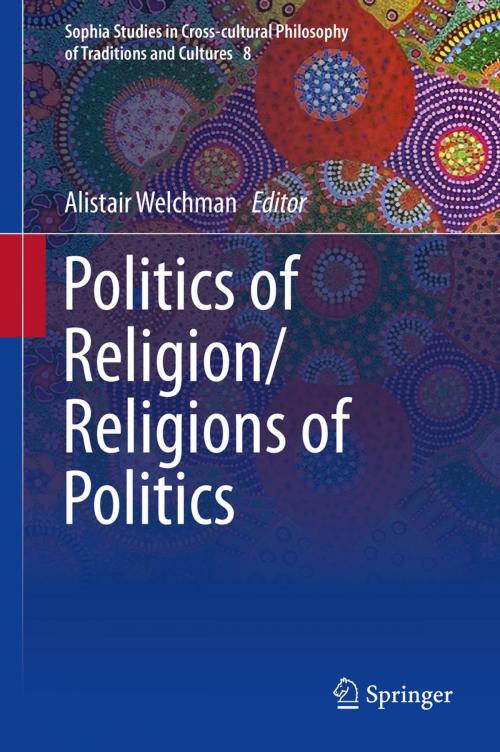Politics of Religion/Religions of Politics
Nonfiction, Religion & Spirituality, Philosophy, Religious| Author: | ISBN: | 9789401794480 | |
| Publisher: | Springer Netherlands | Publication: | October 20, 2014 |
| Imprint: | Springer | Language: | English |
| Author: | |
| ISBN: | 9789401794480 |
| Publisher: | Springer Netherlands |
| Publication: | October 20, 2014 |
| Imprint: | Springer |
| Language: | English |
The liberal enlightenment as well as the more radical left have both traditionally opposed religion as a reactionary force in politics, a view culminating in an identification of the politics of religion as fundamentalist theocracy. But recently a number of thinkers—Agamben, Badiou, Tabues and in particular Simon Critchley—have begun to explore a more productive engagement of the religious and the political in which religion features as a possible or even necessary form of human emancipation. The papers in this collection, deriving from a workshop held on and with Simon Critchley at the University of Texas at San Antonio in February 2010, take up the ways in which religion’s encounter with politics transforms not only politics but also religion itself, molding it into various religions of politics, including not just heretical religious metaphysics, but also what Critchley describes as non-metaphysical religion, the faith of the faithless. Starting from Critchley’s own genealogy of Pauline faith, the articles in this collection explore and defend some of the religions of politics and their implications. Costica Bradatan teases out the implications of Critchley’s substitution of humor for tragedy as the vehicle for the minimal self-distancing required for any politics. Jill Stauffer compares Critchley’s non-metaphysical religiosity with Charles Taylor’s account of Christianity. Alistair Welchman unpacks the political theology of the border in terms of god’s timeless act of creation. Anne O’Byrne explores the subtle dialectic between mores and morality in Rousseau’s political ethics. Roland Champagne sees a kind non-metaphysical religion in Arendt’s category of the political pariah. Davide Panagia presents Critchley’s ethics of exposure as the basis for a non-metaphysical political bond. Philip Quadrio wonders about the political ramifications of Critchley’s own ‘mystical anarchism’ and Tina Chanter re-reads the primal site in the Western tradition at which the political and the religious intersect, the Antigone story, side-stepping philosophical interpretations of the story (dominated by Hegel’s reading) by means of a series of post-colonial re-imaginings of the play. The collection concludes with an interview with Simon Critchley taking up the themes of the workshop in the light of more recent political events: the Arab Spring and the rise and fall of the Occupy movement.
The liberal enlightenment as well as the more radical left have both traditionally opposed religion as a reactionary force in politics, a view culminating in an identification of the politics of religion as fundamentalist theocracy. But recently a number of thinkers—Agamben, Badiou, Tabues and in particular Simon Critchley—have begun to explore a more productive engagement of the religious and the political in which religion features as a possible or even necessary form of human emancipation. The papers in this collection, deriving from a workshop held on and with Simon Critchley at the University of Texas at San Antonio in February 2010, take up the ways in which religion’s encounter with politics transforms not only politics but also religion itself, molding it into various religions of politics, including not just heretical religious metaphysics, but also what Critchley describes as non-metaphysical religion, the faith of the faithless. Starting from Critchley’s own genealogy of Pauline faith, the articles in this collection explore and defend some of the religions of politics and their implications. Costica Bradatan teases out the implications of Critchley’s substitution of humor for tragedy as the vehicle for the minimal self-distancing required for any politics. Jill Stauffer compares Critchley’s non-metaphysical religiosity with Charles Taylor’s account of Christianity. Alistair Welchman unpacks the political theology of the border in terms of god’s timeless act of creation. Anne O’Byrne explores the subtle dialectic between mores and morality in Rousseau’s political ethics. Roland Champagne sees a kind non-metaphysical religion in Arendt’s category of the political pariah. Davide Panagia presents Critchley’s ethics of exposure as the basis for a non-metaphysical political bond. Philip Quadrio wonders about the political ramifications of Critchley’s own ‘mystical anarchism’ and Tina Chanter re-reads the primal site in the Western tradition at which the political and the religious intersect, the Antigone story, side-stepping philosophical interpretations of the story (dominated by Hegel’s reading) by means of a series of post-colonial re-imaginings of the play. The collection concludes with an interview with Simon Critchley taking up the themes of the workshop in the light of more recent political events: the Arab Spring and the rise and fall of the Occupy movement.















